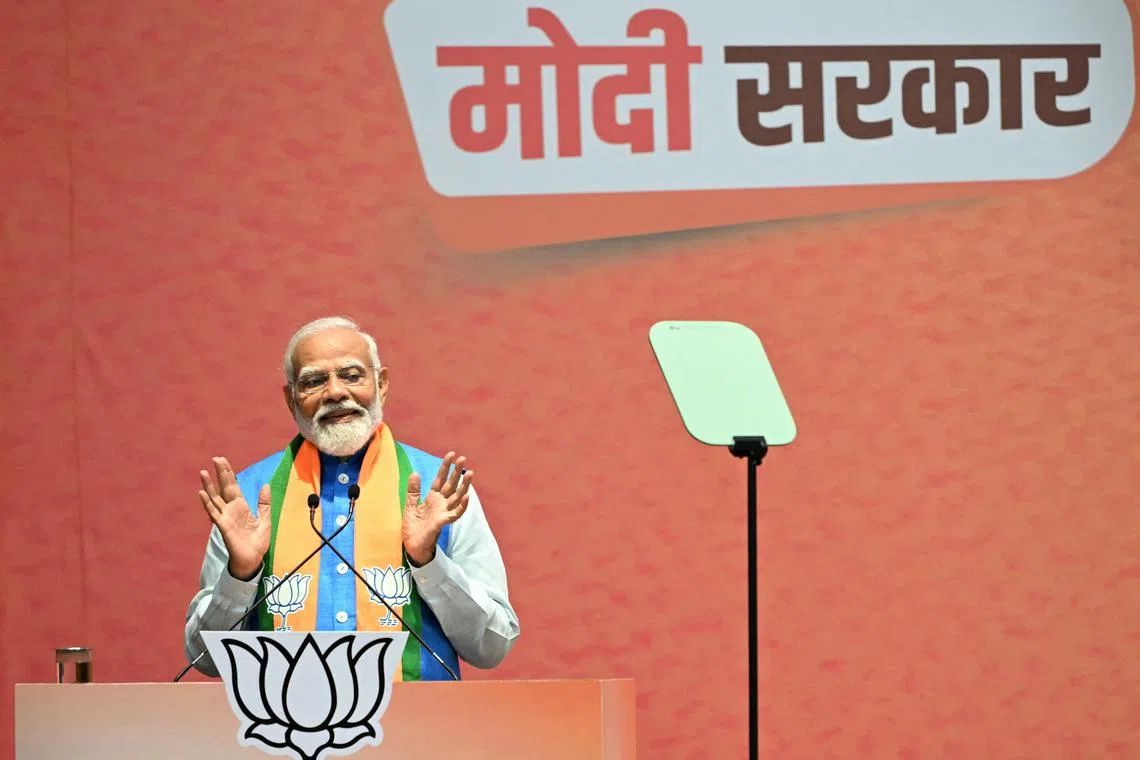Modi’s party vows growth and development in election manifesto
Sign up now: Get insights on Asia's fast-moving developments

India's Prime Minister Narendra Modi speaks after releasing the BJP manifesto ahead of country's general election.
PHOTO: AFP
Follow topic:
NEW DELHI - India’s ruling party pledged to focus on infrastructure and keep popular subsidies in place in its election manifesto as Prime Minister Narendra Modi bids for a historic third term in voting this week.
The Bharatiya Janata Party (BJP) highlighted four key areas, vowing to improve opportunities for underprivileged Indians, women, youth and farmers. The manifesto was released just days before voting begins on April 19.
The party titled its programme Modi Ki Guarantee, or Modi’s Guarantee, arguing that the Prime Minister is a man of his word and fulfils all promises.
Mr Modi has dominated Indian politics since he helped the BJP win the 2014 election in a landslide. He remains hugely popular and has been the party’s star campaigner for the past decade.
“India needs a stable government when the world is going through turmoil and conflict,” Mr Modi said at the manifesto’s launch in New Delhi on April 14.
“Reform, perform is our identity.”
Several BJP leaders speaking at the launch touted Mr Modi’s pledges, with Defence Minister Rajnath Singh describing it “as good as 24-karat gold”.
The party said it will turn India into a global manufacturing hub, and work on making India’s cities more liveable. Mr Modi said he has already instructed officials to begin work on policies to be implemented when he returns to office.
“After June 4, we will start working towards our manifesto promises,” he said.
“We have already started working towards key decisions to be taken in the first 100 days.”
India is posting growth rates of more than 7 per cent, making it the fastest-expanding major economy in the world. Foreign investors have been flocking to the stock market, and businesses are increasingly turning to India as they look to diversify their operations outside of China.
Even so, the economy is not growing fast enough to absorb the millions of young people who join the workforce every year. A mismatch between skills and jobs, and poor schooling means almost a third of graduates are unemployed.
Ms Madhavi Arora, an economist at Emkay Global Financial Services, said Mr Modi’s government has a “decent track record of achieving past manifestos”, adding that the latest programme aims to improve social and economic inclusivity.
“The focus on physical and social infrastructure continues, both of which will improve India’s growth and development potential,” she said.
The BJP won the last two elections with big majorities and has promised to expand its mandate even further. It faces a 20-plus party opposition alliance that appears to be on the back foot, lacking unity and cash-strapped.
The opposition has also accused Mr Modi’s government of using federal investigative agencies to target them. Two prominent leaders – Delhi’s Chief Minister Arvind Kejriwal and Jharkhand Chief Minister Hemant Soren – were recently arrested and jailed on corruption charges, which they say were politically motivated.
The BJP has denied the opposition’s allegations and has said those facing investigation should fight the matter in the courts.
In an apparent reference to the cases, Mr Modi said on April 14 he will continue combating corruption, repeating a vow made in an interview to a local newspaper last week.
The manifesto was released on the birth anniversary of B.R. Ambedkar, the architect of India’s Constitution and a towering figure among India’s Dalit, or lower caste, community. Party leaders paid tribute to Ambedkar at the press conference.
The BJP once again promised to enforce a Uniform Civil Code, a proposed federal measure that would combine current religion-based laws that govern marriage, inheritance and divorce.
The party has, on the campaign trail, trumpeted the fulfilment of other key past pledges, including the revoking of autonomy in Jammu and Kashmir – the country’s only Muslim-majority region – and the building of a controversial temple where a mosque once stood.
Other promises laid out by Mr Modi during the press conference on April 14 included:
Programmes for women’s health, including a scheme for cervical and breast cancer
Discounts for medical care and payments for care for people over 70 years old
Expansion of credit to two million rupees (S$32,600) for small entrepreneurs
Build high-speed trains in the northern, southern and eastern parts of the country
Make India a leading voice of the Global South, expand its diplomatic presence and develop strategic partnerships for mineral security
Bid to host the 2036 Olympics
BLOOMBERG

